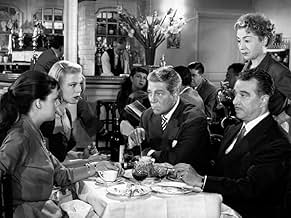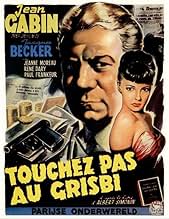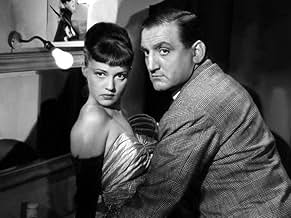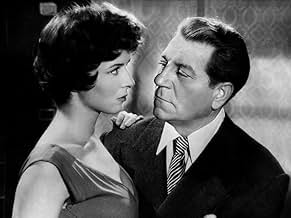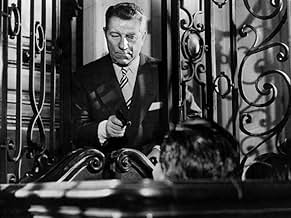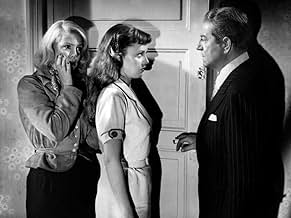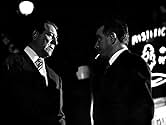IMDb RATING
7.7/10
9.5K
YOUR RATING
An aging, world-weary gangster is double-crossed and forced out of retirement when his best friend is kidnapped and their stash of eight stolen gold bars demanded as ransom.An aging, world-weary gangster is double-crossed and forced out of retirement when his best friend is kidnapped and their stash of eight stolen gold bars demanded as ransom.An aging, world-weary gangster is double-crossed and forced out of retirement when his best friend is kidnapped and their stash of eight stolen gold bars demanded as ransom.
- Director
- Writers
- Stars
- Awards
- 1 win & 1 nomination total
Marilyn Buferd
- Betty
- (as Marilyn Bufferd)
Paul Barge
- Eugène
- (as Barge)
Alain Bouvette
- Le chauffeur de taxi
- (as Bouvette)
- Director
- Writers
- All cast & crew
- Production, box office & more at IMDbPro
7.79.5K
1
2
3
4
5
6
7
8
9
10
Featured reviews
Classic French noir
This masterpiece of French noir exemplifies the depth of friendship and honor between thieves in this classic. The protagonist and his partner could not be more different, but through the years they have developed a friendship beyond mere love, a friendship cemented in the trenches of criminal warfare and not to be trifled with. The plot's treachery is utilized to effect as the polar opposite of this eternal bond, a bond which is best elucidated with some of the more mundane aspects of life. This bond is also compared with the superficial love between the sexes, where men love their woman only during the act of love. The acting was sublime, with heavies Jean Gabin, Lino Ventura, as well as some mightily proportioned women to grace the eyes. The direction and camera work were wonderful, and the score was the perfect compliment to the darker side of life. Genruk' Evil Eye Reviews
influential French film noir
The title of this French film noir is slang for "loot". Jean Gabin stars as racketeer Max. Seeking out the finer things in life, Max intends to pull one last job and retire. After stealing a fortune in gold, our hero is faced with a crisis of conscience when his best friend (Rene Dary) is kidnapped and held for a huge ransom, the proceeds of this last job. Max manages to turn the tables on the abductors, but his dreams of a life of ease explode in his face. Up-and-coming leading lady Jeanne Moreau plays a pivotal role as the femme fatale who leads Dary into the hands of his kidnappers.
An intriguing film that inverts many of the film noir cliches. The heist which drives the film's plot has already occurred when the film starts, which has the effect of shifting the film's focus from the crime itself to the consequences of leading a life of crime. The characters are portrayed less like criminals than businessmen, calmly going about the business of earning a living. As a result, the few scenes of violence that occur are more shocking than they would be in a more routine crime film. An intriguing film that clearly influenced subsequent French crime films, especially Jules Dassin's "Rififi" and Jean-Pierre Melville's "Bob le Flambeur".
An intriguing film that inverts many of the film noir cliches. The heist which drives the film's plot has already occurred when the film starts, which has the effect of shifting the film's focus from the crime itself to the consequences of leading a life of crime. The characters are portrayed less like criminals than businessmen, calmly going about the business of earning a living. As a result, the few scenes of violence that occur are more shocking than they would be in a more routine crime film. An intriguing film that clearly influenced subsequent French crime films, especially Jules Dassin's "Rififi" and Jean-Pierre Melville's "Bob le Flambeur".
10pzanardo
Wonderful gangster-story by Jacques Becker
It would be nonsense to give an order of merit to the three cinematic masterpieces by director Jacques Becker. However, personally I love "Touchez pas au grisbi" even more than "Casque d'or" or "Le Trou". In "Touchez pas au grisbi" we find all we can ask from a Becker's film: splendid black-and-white cinematography, evocative, romantic atmosphere, brilliant script, stunning excellence of the actors' job. But here we get more: a tough, perfectly written gangster-story, swift pace and action blended with an outstanding psychological design.
The movie is mainly a story of friendship and honor. We have two old pals, two aged gangsters close to retire: Max (Jean Gabin), smart and clever, well aware that their best years are over, and Riton (Rene Dary), naive and rash, unable to accept the end of their youth, even dumb if you want, but extremely brave and devoted to his friend. Max is constantly grumbling against Riton and the troubles he causes. He scorns Riton's courage... brains and good sense, that's the important thing... But when it's the time for action, we see how deep and touching their friendship is, how ready they are to sacrifice themselves for each other. In other words, there are circumstances when only courage and honor count...
According to his usual style, Becker describes the world of criminals as a weird parallel of the world of "decent people". To be a gangster appears a job like another: a day at the office. See Max's poise and professional way, when he negotiates the value of the "grisbi" (the swag) with the receiver. And when Max is going to face a last-blood gang-war, he quietly leaves a large sum of money to a trusted bar-maid, in case of need "... to tip somebody (i.e. police or judges)... to fix possible problems... you know better..."
Inside a story narrated in the most understated way, Becker inserts unexpected explosions of violence. Take the owner of the Night Club, another old pal of Max's and Riton's. Poised, always silent, short, fat, with thick glasses, he seems the less harmful person. Yet, suddenly, and without a single word of comment, he starts to brutally beat a thug from a rival gang. And, with the machine-gun, he shows himself even tougher than Max and Riton.
Of course, the movie also offers a Gabin's trade-mark scene, when he slaps everybody, men and women as well. Great stuff: toughness mixed with sense of humour. Gabin's performance is at the highest level reached in a glorious career.
What else to add? "Touchez pas au grisbi" is a fantastic masterpiece. Moreover, I guess that this film is good for all tastes , which probably can't be said for other Becker's cinematic gems.
The movie is mainly a story of friendship and honor. We have two old pals, two aged gangsters close to retire: Max (Jean Gabin), smart and clever, well aware that their best years are over, and Riton (Rene Dary), naive and rash, unable to accept the end of their youth, even dumb if you want, but extremely brave and devoted to his friend. Max is constantly grumbling against Riton and the troubles he causes. He scorns Riton's courage... brains and good sense, that's the important thing... But when it's the time for action, we see how deep and touching their friendship is, how ready they are to sacrifice themselves for each other. In other words, there are circumstances when only courage and honor count...
According to his usual style, Becker describes the world of criminals as a weird parallel of the world of "decent people". To be a gangster appears a job like another: a day at the office. See Max's poise and professional way, when he negotiates the value of the "grisbi" (the swag) with the receiver. And when Max is going to face a last-blood gang-war, he quietly leaves a large sum of money to a trusted bar-maid, in case of need "... to tip somebody (i.e. police or judges)... to fix possible problems... you know better..."
Inside a story narrated in the most understated way, Becker inserts unexpected explosions of violence. Take the owner of the Night Club, another old pal of Max's and Riton's. Poised, always silent, short, fat, with thick glasses, he seems the less harmful person. Yet, suddenly, and without a single word of comment, he starts to brutally beat a thug from a rival gang. And, with the machine-gun, he shows himself even tougher than Max and Riton.
Of course, the movie also offers a Gabin's trade-mark scene, when he slaps everybody, men and women as well. Great stuff: toughness mixed with sense of humour. Gabin's performance is at the highest level reached in a glorious career.
What else to add? "Touchez pas au grisbi" is a fantastic masterpiece. Moreover, I guess that this film is good for all tastes , which probably can't be said for other Becker's cinematic gems.
A true classic
"Grisbi" is a true classic...... Highly influential French noir/crime thriller/drama....shamefully obscure & undeservedly overlooked until now...Criterion DVD finally released in January....actually kinda ruined my evening..I had planned on watching another movie after this one..but I didn't want to let this one out of my head yet,..it was that good. 1954 Paris sparkles in glorious black & white..Jean Gabin & the whole cast, including a very young & relatively unknown Jeanne Moreau, is wonderful..Jacque Becker's direction is impeccable.
The great Jean Gabin stars as Max , an aging gangster, who, along with his longtime friend & partner , Riton , has pulled one last job and intends to retire as soon as it's safe to cash in the millions in gold bullion they have stolen. Max is an anachronism...his style, moral code, honor & ways are caught up in changing times...a theme that fans of some of the best American Westerns will recognize in this film...
It'a an absorbing , character-driven story...leading to a lonely highway with guns drawn ..trying to keep from losing everything. Highly recommended.
The great Jean Gabin stars as Max , an aging gangster, who, along with his longtime friend & partner , Riton , has pulled one last job and intends to retire as soon as it's safe to cash in the millions in gold bullion they have stolen. Max is an anachronism...his style, moral code, honor & ways are caught up in changing times...a theme that fans of some of the best American Westerns will recognize in this film...
It'a an absorbing , character-driven story...leading to a lonely highway with guns drawn ..trying to keep from losing everything. Highly recommended.
A new thrill running down French cinema...
In his pre-war career, Jean Gabin was the greatest French actor of his generation, the living incarnation of a youthful but not immature ardor, a tough and no-nonsense approach to life, a hardened tenacity à la French, all combined with a "Lady Killer" face. With directors such as Duvivier and Carné, he became the figurehead of the poetic realism genre, perhaps French cinema's finest hour, from 1935 to 1939.
But war broke up and Gabin took part to the war effort along the Allies (the right side). When he was back, his hair became grayer, and he looked much older than his actual age. And then started a long slump in his career where he lost his way in forgettable dramas and tear-jerkers. Meanwhile, audiences were thrilled by Jean Marais and laughing with Fernandel. It took Jacques Becker to finally understand the new appeal of Gabin and by adapting Antoine Simonin's level, started his second career as the aging leader (after the romantic antihero and before the white-haired patriarch). The film was "Touchez pas au Grisbi" (Don't Touch the Loot).
And Max is the perfect alter-ego to Gabin, an world-weary hoodlum who just committed his greatest crime before retirement, stealing eight golden ingots from Orly with his friend and partner Riton (René Dary); That Gabin is still a Ladies' Man, attracting voluptuous burlesque dancers and sexy secretaries, tough enough to distribute a few slaps here and principled enough not to abandon his friend. Still, the film doesn't overplay these traits. Max is blasé about his sex-appeal, not quite obsessed with women, only his job and his friends matter.
The film features a long sequence when we seem him opening a bottle, pouring a good wine to him and Riton, cracking a toast, smearing the pâté as meticulously as if they were cracking a safe. And then we see him putting on his pajamas and brushing his teeth. It's not meant to make him look ordinary but to insist that he doesn't let himself distracted by girls, unlike Riton, his total opposite. Riton blabbed to his girlfriend Josy (Jeanne Moreau) about the heist, an information she gave to her new boyfriend Angelo (Lino Ventura), and last time I saw such an epic slap, it was between Steve McQueen and Ali McGraw in "The Getaway". Anyway, Riton is the square one, the softie, not even able to see when he's lured into a trap and in a way, there's something of the slipping Gabin in that Riton, his streak of failing melodramas might have killed his career if Becker didn't find him a tailor-made role.
But Becker did more than putting Gabin's career in the right track, he started a new one and not the least. Lino Ventura was a wrestling matches organizer when he was offered the role of the heavy Angelo. He never pictured himself as an actor and turned down the offer first. He hadn't made up his mind when he came to meet Jean Gabin in the set, it took Becker's son to take him to Gabin's dressing room. When the two men met, Gabin said "How are you?" Ventura said "fine" and Gabin concluded with "well, see you later". That was it. That's all it took for Ventura to accept the role that would instantly put him in the bandwagon of male icon, Gabin's straightforward humility was the perfect trigger to Ventura's motivation. He understood that he was dealing with pros and no-nonsense guys, not stars.
Like Gabin, Ventura never faked, he was a natural, and that showed on the screen. The two men were often rival in the movies but good friends in real life, sharing their passion for good restaurants and values such as friendship and family. So before its own making "Touchez pas au Grisbi" was already blessed by the charisma of two actors and the predestination classic. At a time filled with colorful costume dramas and big-budgeted swashbucklers to counter-attack the rise of TV, Becker opted for a minimalist subject but with a great casting. The format of "Grisbi" is linear and simple, the plot is so accessible that it's secondary, the real thrills is to rediscover Gabin inhabiting a new and see him with deal with people who are as smart and professional as he is.
Angelo is actually a perfect foil for Max while the good friend Riton Is so inept Max contemplated the idea of abandoning him. But Gabin could play greedy thugs but not without honor, and no one would have imagined him being something else. Same with Ventura. And "Grisbi" would open the way to noir classics as "Razzia" "Rififi" or Melville's "Bob le Flambeur", featuring stories mostly set at night when honest people are sleeping, movies centering on men with values and guts, and women whose main purpose is to drive the plot and not in the right direction as the catalysts of men's weaknesses. The female ally was often an aging woman herself, but these movies never held youth in high esteem, we didn't see many kids, young criminals were the most gullible and young women not trustworthy.,
These movies reminded me of that Godfather quote "women and children can be careless, but not men" and perhaps in this line lies the big shift between the old school popular cinema of the 50s 60s and the New Wave that featured many movie centering on youth and women: "400 Blows", "Jules and Jim" with Brigitte Bardot as the new sensation. Belmondo and Delon would later co-star with Gabin and Ventura and then portray in solo, cops or gangsters, like the old men, to prove that macho heroes could still surf the New Wave, and over it.
So, behind his minimalist but efficient approach to the crime genre, "Touchez pas au Grisbi" is a triple milestone in French cinema: restoring Jean Gabin's career, starting Lino Ventura's one and bringing a second breath to French noir cinema.
But war broke up and Gabin took part to the war effort along the Allies (the right side). When he was back, his hair became grayer, and he looked much older than his actual age. And then started a long slump in his career where he lost his way in forgettable dramas and tear-jerkers. Meanwhile, audiences were thrilled by Jean Marais and laughing with Fernandel. It took Jacques Becker to finally understand the new appeal of Gabin and by adapting Antoine Simonin's level, started his second career as the aging leader (after the romantic antihero and before the white-haired patriarch). The film was "Touchez pas au Grisbi" (Don't Touch the Loot).
And Max is the perfect alter-ego to Gabin, an world-weary hoodlum who just committed his greatest crime before retirement, stealing eight golden ingots from Orly with his friend and partner Riton (René Dary); That Gabin is still a Ladies' Man, attracting voluptuous burlesque dancers and sexy secretaries, tough enough to distribute a few slaps here and principled enough not to abandon his friend. Still, the film doesn't overplay these traits. Max is blasé about his sex-appeal, not quite obsessed with women, only his job and his friends matter.
The film features a long sequence when we seem him opening a bottle, pouring a good wine to him and Riton, cracking a toast, smearing the pâté as meticulously as if they were cracking a safe. And then we see him putting on his pajamas and brushing his teeth. It's not meant to make him look ordinary but to insist that he doesn't let himself distracted by girls, unlike Riton, his total opposite. Riton blabbed to his girlfriend Josy (Jeanne Moreau) about the heist, an information she gave to her new boyfriend Angelo (Lino Ventura), and last time I saw such an epic slap, it was between Steve McQueen and Ali McGraw in "The Getaway". Anyway, Riton is the square one, the softie, not even able to see when he's lured into a trap and in a way, there's something of the slipping Gabin in that Riton, his streak of failing melodramas might have killed his career if Becker didn't find him a tailor-made role.
But Becker did more than putting Gabin's career in the right track, he started a new one and not the least. Lino Ventura was a wrestling matches organizer when he was offered the role of the heavy Angelo. He never pictured himself as an actor and turned down the offer first. He hadn't made up his mind when he came to meet Jean Gabin in the set, it took Becker's son to take him to Gabin's dressing room. When the two men met, Gabin said "How are you?" Ventura said "fine" and Gabin concluded with "well, see you later". That was it. That's all it took for Ventura to accept the role that would instantly put him in the bandwagon of male icon, Gabin's straightforward humility was the perfect trigger to Ventura's motivation. He understood that he was dealing with pros and no-nonsense guys, not stars.
Like Gabin, Ventura never faked, he was a natural, and that showed on the screen. The two men were often rival in the movies but good friends in real life, sharing their passion for good restaurants and values such as friendship and family. So before its own making "Touchez pas au Grisbi" was already blessed by the charisma of two actors and the predestination classic. At a time filled with colorful costume dramas and big-budgeted swashbucklers to counter-attack the rise of TV, Becker opted for a minimalist subject but with a great casting. The format of "Grisbi" is linear and simple, the plot is so accessible that it's secondary, the real thrills is to rediscover Gabin inhabiting a new and see him with deal with people who are as smart and professional as he is.
Angelo is actually a perfect foil for Max while the good friend Riton Is so inept Max contemplated the idea of abandoning him. But Gabin could play greedy thugs but not without honor, and no one would have imagined him being something else. Same with Ventura. And "Grisbi" would open the way to noir classics as "Razzia" "Rififi" or Melville's "Bob le Flambeur", featuring stories mostly set at night when honest people are sleeping, movies centering on men with values and guts, and women whose main purpose is to drive the plot and not in the right direction as the catalysts of men's weaknesses. The female ally was often an aging woman herself, but these movies never held youth in high esteem, we didn't see many kids, young criminals were the most gullible and young women not trustworthy.,
These movies reminded me of that Godfather quote "women and children can be careless, but not men" and perhaps in this line lies the big shift between the old school popular cinema of the 50s 60s and the New Wave that featured many movie centering on youth and women: "400 Blows", "Jules and Jim" with Brigitte Bardot as the new sensation. Belmondo and Delon would later co-star with Gabin and Ventura and then portray in solo, cops or gangsters, like the old men, to prove that macho heroes could still surf the New Wave, and over it.
So, behind his minimalist but efficient approach to the crime genre, "Touchez pas au Grisbi" is a triple milestone in French cinema: restoring Jean Gabin's career, starting Lino Ventura's one and bringing a second breath to French noir cinema.
Did you know
- TriviaFilm debut of Italian ex-wrestler Lino Ventura.
- GoofsWhen the submachine guns are removed from the wine box, they are Sten Submachine guns. When they are removed from the car after the ambush, they are Sten Guns. When they are finally shot at the retreating gangsters, they have become two different models of Thompson Submachine guns - an early civilian model of a Thompson and a military model (M1 or M1A1) of a Thompson.
- ConnectionsEdited into Histoire(s) du cinéma: Une vague nouvelle (1999)
- How long is Don't Touch the Loot?Powered by Alexa
Details
Box office
- Gross US & Canada
- $131,548
- Opening weekend US & Canada
- $21,674
- Sep 7, 2003
- Gross worldwide
- $131,548
- Runtime
- 1h 36m(96 min)
- Color
- Aspect ratio
- 1.33 : 1
Contribute to this page
Suggest an edit or add missing content

![Watch Bande-annonce [OV]](https://m.media-amazon.com/images/M/MV5BMDdjNGE5Y2QtMDQ4My00M2Q3LTgwMGYtMjYxMzNlNmY1MTlhXkEyXkFqcGdeQXRyYW5zY29kZS13b3JrZmxvdw@@._V1_QL75_UX500_CR0)
